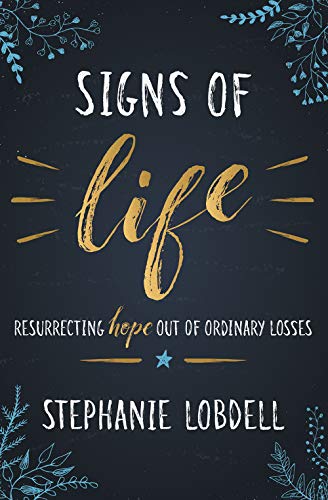Book Review: Signs of Life: Resurrecting Hope out of Ordinary Losses
By Dr. Jamieson Spencer

Signs of Life: resurrecting hope out of ordinary losses
By Stephanie Lobdell
Herald Press, 2019.

She organizes her story as a search for the title’s “signs of life,” signs she discovers in a series of “ordinary losses” through which her nine chapters walk us. Here are four: Zeal, Expectations, Beauty and Invincibility. As she stresses these multiple emotional and spiritual losses she has confronted, she earns both our sympathy and admiration.
What particularly impressed me is the number of Old Testament narratives and characters she brings to bear on these struggles. She mentions not just David and Esau, but also Naaman, Hagar and Jacob. She relies on Old Testament scripture to make her point about the importance of “resurrection” as a recurring human, emotional need, rather than focusing more pointedly on resurrection of Jesus which the new testament proclaims.
I also appreciate her frankness in pointing out certain behavioral or doctrinal inadequacies of the denomination in which she was brought up. She points out its various faults or missteps, though she is either tactful or careful enough never to identify her home sect…(She and the providers of several of her blurbs all attended, or are professors at, the Nazarene Theological Seminary.) In the course of her journey, she offers some frank criticism of her institutional faith.
She makes particularly pointed criticism of its attitude to women. These are the most poignant and effective parts of her autobiographical confession. (The first four blurbs the book announces are by women.) She laments the resistance of many protestant sects to the idea of women pastors. “The percentage of female pastors still stands at 10%.” But she grudgingly accepts that the number, while “dismal,” “is a radical increase from the paltry 2.3 percent” of twenty years before.
Her insights are especially keen (and psychologically credible) when she is wrestling with her early poor reception as such a pastor. Aware of the need to prove herself to the congregation who resisted her debut, she makes the sharp and surprisingly generous and self-critical observation that she felt the need to prove herself: “How ironic that I would grasp for power or control to prove myself a shepherd. How like the world and how unlike the Good Shepherd.”
Tied to her sensitivity to her role as a woman and how our culture judges it, she makes an important point about how we are raised to despise “the body.” “The consequences of the body narrative of culture are easy to identify, most poignantly among women and girls.” She also aims her criticism at her faith’s failure to combat such judgements. She feels “captured by the lying nature of culture, and with no viable substitute from the church that has anything of substance to say of my body today.”
She recurs continually to “the power of sin.” She blames that force for the “disordered gender relationships” which she laments that “still [rend] the Spirit-breathed vocational expectation of many women.” I agree with her “alas,” though my more secular side would suggest the problem lies with current social habits and beliefs, not with what I’d call her faith’s too-easily-reliable doctrinal vocabulary.
Another good spiritual and psychological insight Ms. Lobdell provides comes from a former pastor (her father actually): “he would gently remind me: ‘the call is not to forgive and forget, but to forgive every time you remember.’” This is psychologically astute. It’s much truer to how our ethics and memories guide us in our actual “lived” lives. We are not invincible–we do gunny sack some old grudges. But we can learn–and learn to practice–generosity and forgiveness. Time and again.
Where I might take issue with Pastor Lobdell is with her to me very traditional and therefore quite old-fashioned reliance on “The Fall” as explanatory of our current condition. “We live in … a world deeply marred by the effects of the fall.” She speaks of “illness and death,” for example, as being “the symptoms of a broken creation.” I think a more rational, science-informed take on this “fallen condition” accepts that it is the inevitable result of, and is conditioned by, our mammalian heritage. Our species, much like its predecessor participants on this globe, has had to learn to adapt. She also resorts to words like “forever” or “eternity.” My perspective is far more secular, immediate and is unmoved by considerations of any life beyond this one.
We can celebrate that Pastor Lobdell outgrew the youthful perspective that her church imposed on her, some of which included “believing in a six-day creation … [practicing] abstinence from alcohol and voting Republican.” We more progressive Christians can still be touched and moved by this lengthy confession and sharp personal scrutiny, penned by a devoted and passionate and honest woman of faith.
There is much to admire and revere in this woman’s personal struggles and her efforts to come to terms with some of her sect’s regrettable stands. But we can, above all, salute her conviction that “we are invited to participate in God’s redemptive work.”
~ Jamie Spencer
(Dr. Jamieson Spencer)
